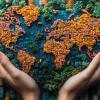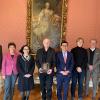
More than 70 leading EU policy and governmental decision makers came together to lay the foundation for a bold new vision for Europe's nature protection in the first NaturaConnect stakeholder event this year.
Organized by the Horizon Europe NaturaConnect project, the event welcomed a diverse range of influential stakeholders, from country representatives to European Union delegates and international and European conservation organizations.
At the heart of the NaturaConnect project is the goal of supporting the creation of a Trans-European Nature Network (TEN-N) of protected and connected areas that conserve at least 30% of land in the EU and benefit both nature and people.
By providing technical support and data, tools, and knowledge, NaturaConnect can help EU Member States revise their protected area pledges and implement them on the ground. NaturaConnect is also tasked with assisting with the evaluation of the first round of member states’ protected area pledges under the EU Biodiversity Strategy for 2030. In an ambitious and far-reaching program of measures, the Strategy aims to halt and reverse biodiversity loss in the EU. The event provided participants with the chance to initiate conversations between actors from science, public administration, and non-governmental organizations, to engage in dialogue aimed at determining how to implement the EU Biodiversity Strategy for 2030, including the design and management of the TEN-N.
Neil McIntosh, representing the EUROPARC Federation, welcomed participants to the event, noting that the day would be focused on “building the dialogue necessary to protect and preserve biodiversity, and connect areas, nature, and people through a variety of participatory processes.”
As a representative of NaturaConnect's co-coordinating organization, Piero Visconti from the International Institute for Applied Systems Analysis (IIASA) emphasized NaturaConnect's key role in supporting EU Member States in their TEN-N design. Néstor Fernández, representative from the German Centre for Integrative Biodiversity Research (iDiv), Martin Luther University Halle-Wittenberg (MLU), NaturaConnect’s other co-coordinating organization, outlined the project’s main objectives and outputs over its lifetime.
The participants then had small group discussions on what the specific needs are for the realization of a coherent and resilient TEN-N. Governance and financial gridlocks were extensively discussed. Among the key takeaways from the session on the future TEN-N were the value of co-creation of knowledge and guidance for TEN-N together with those responsible for planning and implementation, and the need for a long-term perspective on area-based conservation planning in Europe, which prioritizes the quality of conserved areas.
Frank Vassen from the European Commission Directorate-General for Environment highlighted the critical role that science, and this project in particular, will have on supporting effective protected area policies in Europe.
Piero Visconti noted “through providing technical and scientific support, NaturaConnect will act to address key challenges identified by our stakeholders at this workshop and through our ongoing dialogue with key actors involved in the planning and implementation of area-based conservation in the EU.”
Further information:
About NaturaConnect:
NaturaConnect aims to design and develop a blueprint for a truly coherent Trans-European Nature Network (TEN-N) of conserved areas that protect at least 30% of land in the European Union, with at least one third of it under strict protection. Our project unites universities and research institutes, government bodies and non-governmental organizations, working together with key stakeholders to create targeted knowledge and tools, and build the capacity needed to support European Union Member States in realizing an ecologically representative, resilient and well-connected network of conserved areas across Europe.
News

06 March 2025
IIASA’s CAT Research Group joined the UN ECOSOC Partnership Forum 2025’s event: Global Challenges Action Innovation, Emerging Technologies & the Power of Partnerships

21 February 2025
Vietnamese Ambassador and IIASA discuss strengthening research collaboration

10 February 2025



